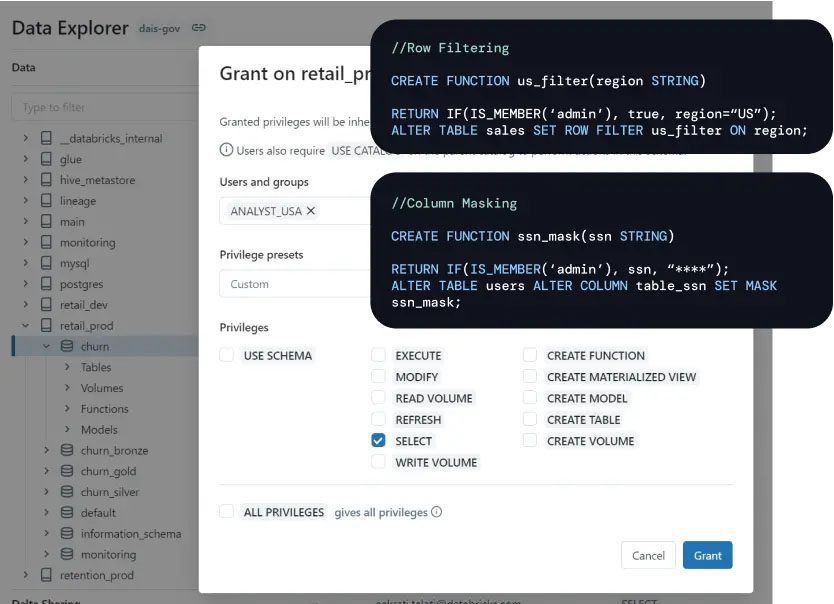CONTACT US
Databricks Unity Catalog: Unlock Centralized and Effective Enterprise Data Governance and Discovery
The Databricks Unity Catalog was developed as a much-needed data governance and discovery solution for enterprises using the lakehouse architecture within their environment. For organizations concerned with efficiently governing their data, both structured and unstructured, alongside machine learning models and other assets, the Databricks Unity Catalog is a solution worth exploring.
What Is a Databricks Unity Catalog?
Databricks Unity Catalog stands out as the industry’s first comprehensive governance solution for data and AI within the Databricks lakehouse framework. This innovative tool empowers organizations to effortlessly oversee both structured and unstructured data, machine learning models, notebooks, dashboards, and files across diverse clouds and platforms. With the Unity Catalog, data scientists, analysts, and engineers have a secure platform for discovering, accessing, and collaborating on reliable data and AI assets. Harnessing the power of AI, this unified governance approach enhances productivity and unleashes the full potential of the lakehouse environment. The streamlined governance provided by this solution expedites data and AI initiatives while ensuring compliance with regulatory requirements.
What Is a Data Lakehouse?
The Databricks architecture for the data lakehouse underlies the company’s Data Intelligence Platform, a foundation upon which companies can expand data and AI usage across the organization. But what exactly is a lakehouse?
The term ‘data lakehouse’ is a combination of two existing data architectures: data lake and data warehouse. A data lake is a repository whose purpose is to store, process, and secure an enterprise’s data, usually in large volumes and in its original format. A data warehouse, by comparison, is designed to incorporate data analytics, reading data and identifying relationships and trends.
The data lakehouse combines both of those concepts, applying analytics and structure to larger data volumes without altering them. It’s a key distinction for the development of artificial intelligence applications to benefit modern business needs.
Understanding Databricks Unity Catalog
Databricks Unity Catalog is an integral component of the Databricks Lakehouse platform, designed to centralize data governance across an organization’s data and AI assets. It serves as a unified data catalog, enabling seamless management and security of data across various data sources and formats. The Unity Catalog consolidates metadata from disparate data systems, allowing for a holistic view of the enterprise’s data landscape.

- Centralized Data Governance. Take advantage of a singular framework for organizations to manage data access, security policies, and compliance in one place.
- Total Access Control. Organizations can implement detailed access controls, ensuring that data is available to the right users and applications while maintaining data privacy and compliance.
- Unified Data Management. Leverage simplified management of diverse structured or unstructured data assets no matter where they reside to effectively manage assets in data lakes, warehouses, or other storage systems.
- Data Lineage and Auditing. Track data lineage to enable more efficient compliance responses, audit activities, or even debugging efforts
Why Is Data Governance Important?
Data governance is the cornerstone of effective data management, particularly in enterprise environments where data volumes and complexity are substantial. It encompasses the policies, standards, and processes that ensure data integrity, quality, and security. Data governance has long been a specialized or outsourced function, not a built-in component of data platforms. Databricks’ addresses this situation directly with several key benefits as the result.
Facilitating Compliance and Security
Robust data governance is non-negotiable, especially today as data privacy and breaches are nearly ubiquitous. The Unity Catalog aids enterprises adhere to applicable regulations by providing comprehensive tools to manage data access and monitor data usage. With centralized data discovery it’s much simpler to respond to regulatory inquiries and audits.
Enhancing Data Quality and Reliability
Effective data governance ensures that the data used for decision-making is accurate, consistent, and reliable. A centralized governance model facilitates the maintenance of high data quality standards across the organization.
Streamlining Data Management
With the increasing complexity of data ecosystems, centralized data governance simplifies management tasks. Databricks’ unified approach allows for more efficient data handling, reducing operational complexities and costs.
The Role of Data Discovery in Enhancing Data Utilization
Data discovery is the process of identifying and understanding data assets within an organization. It is crucial for maximizing the value of these assets. Databricks Unity Catalog enhances data discovery, providing a comprehensive view of available data assets to make finding and accessing data needed for specific tasks easier.
Simplifying data discovery enables data democratization, allowing a wider range of users to leverage data for insights and innovation without compromising on governance and security. This, in turn, fosters cross-functional collaboration, as teams can easily share and access relevant data, leading to more informed decision-making and innovative solutions.
Databricks Unity Catalog Implementation Considerations
Adopting the Databricks Unity Catalog requires careful planning and consideration, an area the Graphable team can help navigate. It involves aligning with existing data infrastructure, training users, and continuously monitoring and refining data governance policies.
Organizations need to evaluate how the solution integrates with their current data landscape, ensuring seamless compatibility and minimal disruption to existing workflows. Once that’s established, users must be educated on new processes and best practices to take advantage of the data management and governance advantages.
Post-implementation, data governance is an ongoing process. Organizations should regularly review and update their governance policies and practices in response to evolving data landscapes, regulatory changes, and technological advancements.
Moving Toward Effective Data Governance for All
The Databricks Unity Catalog represents a significant step forward in enterprise data management, offering robust solutions for data governance and discovery. By centralizing governance, enhancing data accessibility, and ensuring data security and compliance, the Unity Catalog empowers organizations to efficiently manage and utilize their data assets.
As enterprises continue to navigate the complexities of data management, tools like the Unity Catalog will be essential in harnessing the full potential of their data ecosystems. Are you considering or already using Databricks in your enterprise? Contact us to discuss how we can help introduce centralized data governance and discovery into your environment.
Related articles:
- What is Databricks? For data warehousing, data engineering, and data science
- Databricks Architecture – A Clear and Concise Explanation
- Databricks vs Snowflake compared
- What is Databricks Dolly 2.0 LLM?
- Databricks SQL Warehouse: Unlock the Power of 4 Proven Strategies



